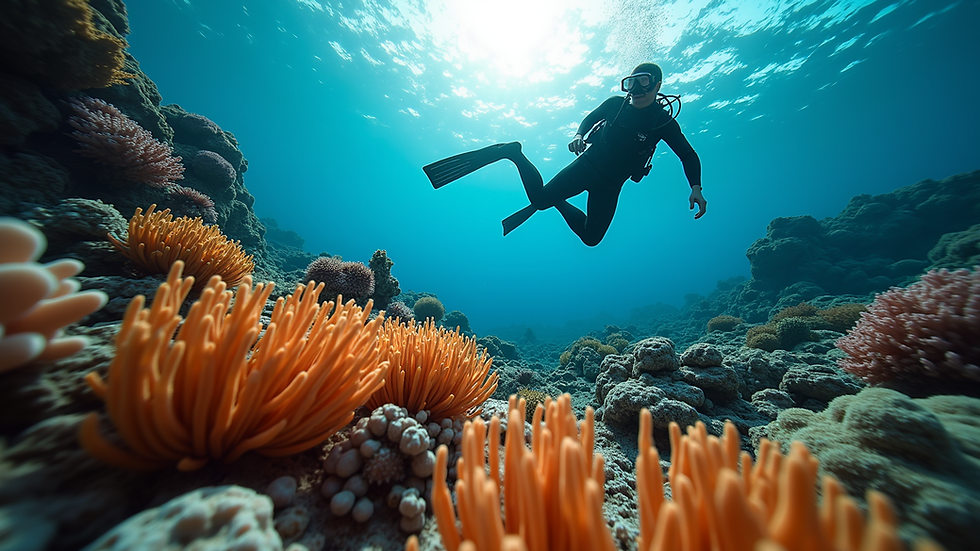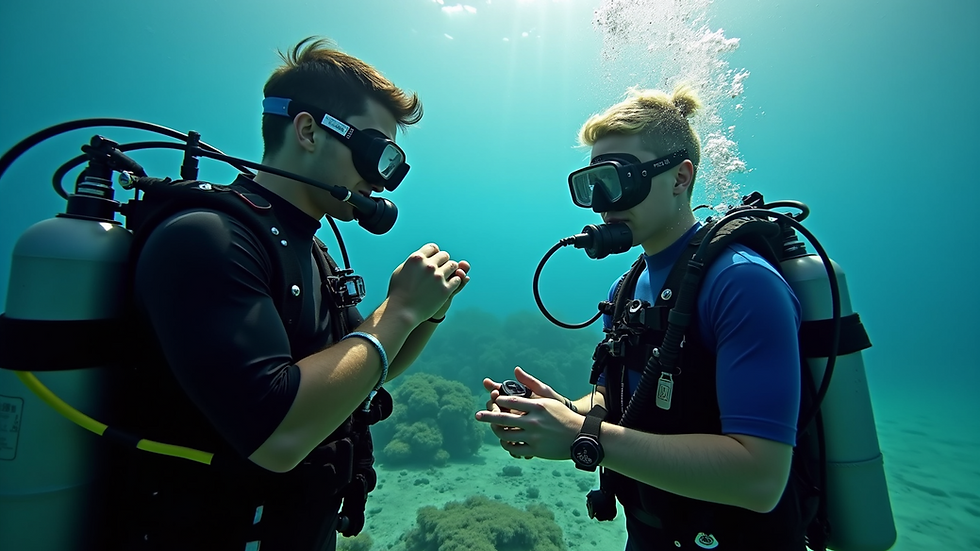Exploring the Mysteries of the Ocean Depths
- Karl

- Jun 3, 2025
- 4 min read
The ocean covers more than 70% of our planet, yet most of it remains unexplored and shrouded in mystery. The depths of the ocean hold secrets that have captivated scientists, explorers, and adventurers alike. From unusual creatures to hidden landscapes, understanding the mysteries of the ocean depths can provide insight into our planet's health and the future of marine life.
The Ocean Depths: A World Below
The ocean can be divided into different zones, each characterized by unique conditions and life forms. The depth of the ocean plays a pivotal role in determining these conditions. The surface waters, influenced by sunlight and wind, teem with vibrant life. However, as we descend into the depths, pressure increases, sunlight fades, and temperatures drop, creating an entirely different environment.
One of the most profound zones in the ocean is the abyssal zone, which exists between 2,000 to 6,000 meters below the surface. In this dark, cold world, scientists have discovered bizarre creatures like the anglerfish and giant squid, which have adapted to survive in such extreme conditions.

The Importance of Ocean Exploration
Exploring the ocean depths is not just an adventurous pursuit. It has significant implications for science and environmental conservation. The ocean plays a crucial role in regulating the Earth's climate, storing carbon, and supporting biodiversity. According to the United Nations, the ocean absorbs approximately 30% of the carbon dioxide produced by humans, which helps mitigate climate change.
However, with the rise of pollution, overfishing, and climate change, the health of our oceans is at risk. Understanding the ocean's complexities can inform conservation efforts and help develop sustainable practices. For instance, deep-sea research has led to the discovery of new species and ecosystems that could be pivotal in medicine and biotechnology.
The Technology Behind Ocean Exploration
The ocean's depths are not easily accessible, requiring advanced technology for exploration. Submersibles like the DSV Alvin can dive to significant depths, allowing researchers to collect samples and conduct observations. These submersibles are equipped with cameras and scientific instruments to capture data about ocean conditions and marine life.
Remotely operated vehicles (ROVs) are also frequently used. They can reach depths that human divers cannot, providing valuable footage and insights into the underwater world.

Fascinating Discoveries from the Deep
Numerous discoveries have originated from deep-sea explorations. For instance, hydrothermal vents have been found to host unique ecosystems entirely independent of sunlight. These vents expel superheated water rich in minerals, creating a habitat for species like tube worms and extremophiles.
Additionally, researchers have encountered underwater volcanic mountains known as seamounts. These geological formations are hotspots for biodiversity and are often home to species that are yet to be classified.
The discoveries do not stop at flora and fauna. Sunken ships and lost cities sometimes lie beneath the waves, preserving history in ways that land archaeology might not.
Your Gateway to the Deep
If you're eager to explore the wonders of the ocean depths yourself, various opportunities exist. Many organizations offer guided tours and experiences allowing enthusiasts to engage in deep scuba diving, where you can witness marine life in its natural habitat. This experience can create a lasting passion for ocean conservation.
While considering a deep diving adventure, it’s essential to prepare thoroughly. Take a diving certification course, invest in good equipment, and research diving locations. Visit this link for more resources on deep scuba diving.

Preserving Our Ocean Treasures
As humanity continues to explore the ocean depths, it is paramount that we also protect these precious environments. Marine protected areas (MPAs) are one way to conserve habitats. These MPAs restrict fishing, drilling, and other potentially harmful activities, allowing ecosystems to thrive.
Another crucial initiative is the reduction of plastic waste entering our oceans. Each year, millions of tons of plastic end up in the sea, threatening marine life and ecosystems. Supporting legislation aimed at reducing plastic use and increasing recycling can help mitigate this issue.
In addition, participating in beach clean-ups or advocating for policies that protect marine life can make a significant difference. Small actions can collectively contribute to preserving our ocean's health.
The Future of Ocean Exploration
The future of ocean exploration is bright. With advancements in technology and a growing awareness of the importance of marine conservation, we can expect new discoveries that will further inform both science and policy. The potential for finding new species, understanding climate change, and even discovering underwater resources is enormous.
As we deepen our understanding of the ocean, we must continue to advocate for its protection. By combining exploration with conservation, we can ensure that the mysteries of the ocean depths are preserved for future generations.
Embarking on the journey of uncovering the ocean's secrets not only satisfies curiosity but also aligns with the responsibility we hold as stewards of our planet. Let’s dive deep, discover, and protect the intricate world beneath the waves!
Exploring the ocean depths can be an awe-inspiring journey that provides insights into our planet's past, present, and future. Whether through scientific research or personal adventure, understanding the ocean's complexities is crucial for both knowledge and preservation. So grab your gear, support conservation efforts, and let’s explore this mesmerizing underwater world together!






Comments